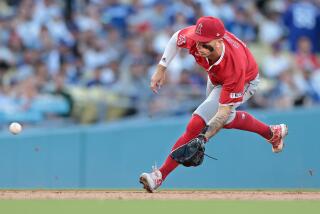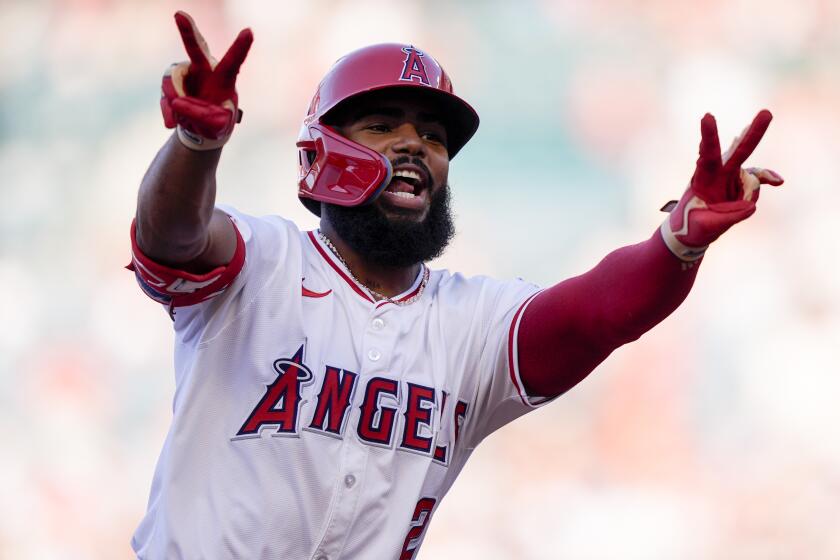Starting Over--Reluctantly : Ex-Angel Beniquez Adujsts at 3rd With Orioles, but Disputes Reasons for Leaving
- Share via
Turn and face the strange changes, Juan Beniquez.
You are no longer a member of the California Angels, a team you led in hitting during the previous two seasons. You now wear the black and orange of the Baltimore Orioles and play for that little stubby guy named Earl who grows tomatoes behind the outfield fences.
You are no longer an outfielder or a first baseman or even a designated hitter. You now play third base, covering the same hallowed ground where Brooks Robinson once crouched and dived and made the Hall of Fame. Genuflect before you scoop up that next grounder.
You batted better than .300 the past three years and became a free agent last December. In earlier times you’re a rich man, but in the bear market of 1985-86, you could only scrape up a one-year deal worth a relative stipend of $400,000.
Strange days, indeed.
At 36, Juan Beniquez says he has come to accept the changes. He says these things happen in baseball. Just a part of the game.
But he won’t say he doesn’t hold a grudge.
Beniquez believes the Angels played a foul game of negotiations once his contract expired after last season. He believes the Angels have unfairly portrayed Beniquez’s agent, Ray Negron, as the fall guy in explaining why their top hitter left Anaheim and signed for less money in Baltimore than the Angels were offering ($500,000).
“People read that I left the Angels and signed for less money, but they are not hearing the whole story,” Beniquez said. “The Angels blame it on Ray and say he blew it. But they don’t speak the truth.”
The standard Angel line on Beniquez’s departure is that Negron, just 24, was inexperienced in contract negotiations, made unrealistic demands and, in the end, panicked.
“I will never forgive Juan Beniquez’s agent for selling him a bill of goods,” Angel Manager Gene Mauch said. “He said, ‘Juan, don’t worry, I can get you a two- or three-year contract.’ He had to settle for a one-year contract somewhere else for less money than we were offering.
“I don’t know his agent, but I don’t like him.”
Mauch’s comments appeared in the Baltimore newspapers during the Angels’ visit there last week. Beniquez didn’t like what he saw.
“The way they turned it around in the papers hurt me,” Beniquez said. “We tried to stay (with the Angels) but no one is gonna sign a one-year, no guarantee contract. That’s what the Angels offered.
“For five years, I did the job for them and I thought after that, they might show me some respect. No. No respect.
“Why did I sign with Baltimore? It was less, but it was guaranteed. What good is $500,000 with no guarantee and you’re not around to get it?”
Angel General Manager Mike Port has explained his decision not to guarantee Beniquez’s 1986 contract as that it was pointless, claiming it was unlikely that the Angels would cut their leading hitter of the past two seasons.
Beniquez said Negron played it smart, sensing that the owners’ move to a 24-man roster was inevitable and thus holding out for a guarantee.
“What happens if I sign with California and they cut to 24?” Beniquez said. “I’m in the area where I could be considered the 25th man. I could be in Puerto Rico right now.
“Look at the players who signed no-guarantee contracts. Every one got released. I have to take care of my family. No way I want to be in that limbo.”
Beniquez also claimed Port reneged on an earlier contract offer, just before the Dec. 15 deadline.
“We agreed to take a one-year contract, guaranteed, and 10 minutes before the deadline, Mike Port calls up and says no, no guarantee,” Beniquez said. “They tried to play a trick on me. Mike Port was not fair with us.”
The deadline passed and Beniquez became a former Angel.
“I cried when I found out I’m longer a part of the California Angels,” Beniquez said. “My family (in Puerto Rico) cried, too. They are still fans of the California Angels. They still root for them. I tell them, ‘I play for Baltimore now.’ They say, ‘You played for California for five years; this will take a little while to get used to.’ ”
Beniquez admits he hasn’t become completely accustomed to the concept yet. He doesn’t understand how the Angels could cut him loose so easily--particularly considering the team’s great struggles against left-hand pitching.
Beniquez led the Angels in hitting against left-handers in each of the past three seasons--.319 in 1983, .366 in 1984, .355 in 1985.
Without Beniquez, the Angels are 3-11 against left-handed starters this year.
“And now they say they’re looking for one guy who can hit left-handers,” Beniquez said. “Why did they let me go?”
Beniquez doesn’t like to speculate, but a player hears things.
He hears that maybe the Angels, trying to foster a wholesome image in clean-cut Orange County, didn’t care for his past reputation as a malcontent. He hears that maybe the Angels considered him a bad influence on the other Latin players on the team.
It is idle talk, but it makes Beniquez wonder nonetheless.
“I have heard things about my background, that they tried to blackball me,” Beniquez said. “I heard that they thought I was no good for the Latin guys. This may not be true, but these are things I have heard.”
Negron expressed these same concerns during contract negotiations last winter. The words Beniquez and bad attitude became linked on his scouting report during earlier days in Texas, but Beniquez insists that is past history.
He maintains he was well-liked among the Angel players. He said he complained only when his playing time dwindled.
“Sometimes I did get mad--because I was not playing,” Beniquez said.” But that’s no reason to get mad at a ballplayer. You want a player to want to play.
“I enjoyed playing in California; I wanted to stay. I am still close with the Angel players. To me, they are my friends.”
The greetings Beniquez received from his ex-teammates at Memorial Stadium seemed to support that claim. After taking batting practice, Beniquez would trot down the right-field line and exchange laughs with the names he used to join on the same lineup card.
Doug DeCinces wandered over to talk third base with this new member of the fraternity. “You want this?” DeCinces said with a grin, offering Beniquez his glove. “You better be careful out there.”
Beniquez laughed. “Whenever something hard is hit at me, I just close my eyes and open my glove,” he said. “I know I’m going to make some errors.”
Beniquez is the latest stopgap at a position that has never really recovered from post-Brooks depression. DeCinces filled in ably for a few years, but since his trade to the Angels in 1981, third base in Baltimore has been held down by such notables as Todd Cruz, Wayne Gross, Ron Jackson, Tom O’Malley, Jackie Gutierrez, Floyd Rayford.
And now, Beniquez.
The idea was to add a little more offense to a lineup that ranked 11th among 14 American League clubs in hitting by mid-May. Rayford and Gutierrez had split time at the position through the first 1 1/2 months, but Gutierrez got hurt and Rayford stopped hitting.
Beniquez came to the park one night three weeks ago and Manager Earl Weaver had a surprise for him.
“He told me, ‘Rayford’s in a slump, you’re going to play third,’ ” Beniquez recalled. “I had played there four innings in spring training and hadn’t even taken a ground ball (in infield practice) there since.
“But he said, ‘Go to third’ and I said OK. It’s not my favorite position, but at least I’m in the lineup.”
Were it not for third base, Beniquez would be buried on the bench. The outfield is congested, with Fred Lynn, Mike Young, John Shelby and Lee Lacy ahead of him. Larry Sheets is batting .333 as the Orioles’ designated hitter. And first base? A guy named Eddie Murray usually plays there.
Beniquez broke in as a shortstop with the Boston Red Sox, but that was 13 years ago. Weaver, though, likens it to riding a bike, something you don’t forget. He says Beniquez plays “a decent third base.”
Opposing teams have tried to exploit his inexperience, however, dumping bunts in his direction. The A’s based an entire game plan around it. Tony Phillips beat out one bunt, but Beniquez handled and threw out the next three attempts.
The Angels got away with it once, with Brian Downing driving in a run on a surprise bunt single. But the next night, Beniquez took away two hits by diving to snag a line drive and staggering into the hole to glove a sharper grounder and throw out Bob Boone.
“Anybody who started as a shortstop probably has the ability to play third,” Mauch said. “He probably won’t play it like a couple of players did in this ballpark, but he’ll be all right.”
Mauch remains a Beniquez supporter.
“There is no league Juan Beniquez can’t hit in,” Mauch said. “He’s one of the finest right-handed hitters I have ever seen.”
But now, Mauch watches him from the opposing dugout. Tonight, Beniquez returns to Anaheim Stadium, but for the first time since 1980, he’ll be wearing the visiting grays.
This is not the way Beniquez wanted it.
“They kept a lot of guys who did not do half the job I did,” Beniquez said. “Some of them have two- or three-year contracts. I did the job for them for five years. They wouldn’t guarantee me for one.
“That was not the right way to treat me.”
More to Read
Go beyond the scoreboard
Get the latest on L.A.'s teams in the daily Sports Report newsletter.
You may occasionally receive promotional content from the Los Angeles Times.






